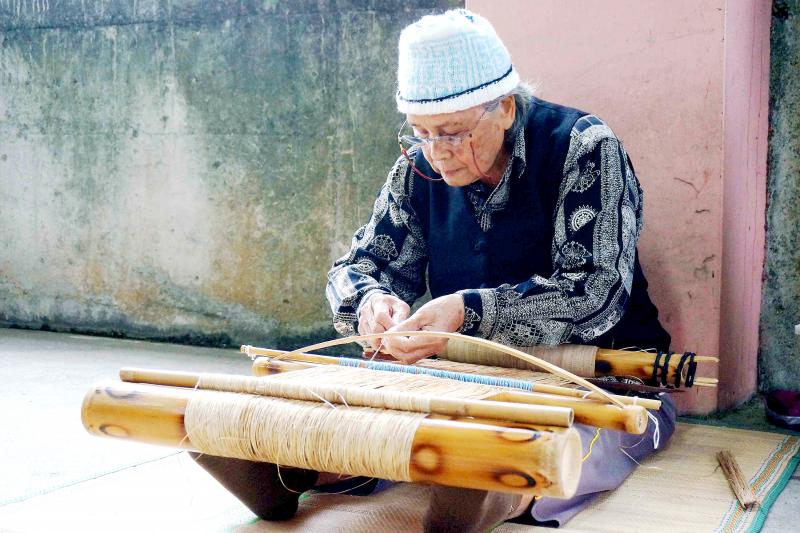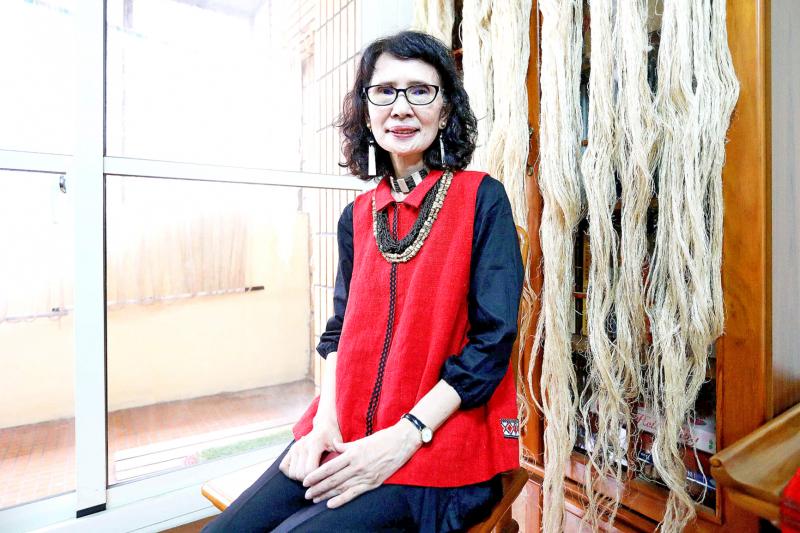The Ministry of Culture has designated two traditional Aboriginal weaving techniques as intangible cultural heritage and is to draft plans for their preservation.
The two techniques — gaya tminun of the Seediq and ni tenunan tu benina of the Kavalan — are to be protected under the Cultural Heritage Preservation Act (文化資產保存法), the ministry said in a statement on Monday.
According to Article 92 of the act, the government must draft plans to preserve designated intangible cultural heritage and document, and teach or take measures to preserve and conserve cultural heritage that is on the verge of disappearing.

Photo courtesy of the Ministry of Culture via CNA
It was the first time the traditional craftsmanship of the Seediq and Kavalan — two of Taiwan’s 16 officially recognized Aboriginal communities — has been designated as cultural heritage.
The ministry praised gaya tminun as the embodiment of the Seediq’s weaving culture.
“Fabrics represent the crystallization of culture shared by Seediq women over the past several hundred and even 1,000 years,” the ministry said.

Photo courtesy of the Ministry of Culture via CNA
The ministry also named Chang Feng-ying of the Seediq as the keeper of gaya tminun, and Yen Yu-ying (嚴玉英) the keeper of ni tenunan tu benina.
Chang inherited the weaving technique from her mother and grandmother, and she mastered the most challenging technique, called puniri, that is used to create formal dresses, it said.
Chang is recognized by her community as the most talented and skillful weaver, and she has devoted herself to passing on weaving techniques to others so that the skills and knowledge of puniri can spread, the ministry said.
The ministry described ni tenunan tu benina, which uses banana leaves and mainly consists of a plain weave, as representative of the craftsmanship of the Kavalan.
The technique is “an important cultural feature of a tribal renaissance movement,” and plays a significant role in creating cohesion within Aboriginal groups and in promoting their identity, it said.
The ministry praised Yen as the weaver who is most familiar with all the necessary skills and tools used for weaving with banana leaves, as well as the traditional ritual, called paspaw, performed to pray for blessings from ancestors’ spirits to allow the weaving to proceed without problems.
Yen’s craftsmanship “offers a ray of hope for the preservation of her tribe’s nearly extinct weaving knowledge and culture,” the ministry said.

Chinese Nationalist Party (KMT) Chairman Eric Chu (朱立倫), spokeswoman Yang Chih-yu (楊智伃) and Legislator Hsieh Lung-chieh (謝龍介) would be summoned by police for questioning for leading an illegal assembly on Thursday evening last week, Minister of the Interior Liu Shyh-fang (劉世芳) said today. The three KMT officials led an assembly outside the Taipei City Prosecutors’ Office, a restricted area where public assembly is not allowed, protesting the questioning of several KMT staff and searches of KMT headquarters and offices in a recall petition forgery case. Chu, Yang and Hsieh are all suspected of contravening the Assembly and Parade Act (集會遊行法) by holding

PRAISE: Japanese visitor Takashi Kubota said the Taiwanese temple architecture images showcased in the AI Art Gallery were the most impressive displays he saw Taiwan does not have an official pavilion at the World Expo in Osaka, Japan, because of its diplomatic predicament, but the government-backed Tech World pavilion is drawing interest with its unique recreations of works by Taiwanese artists. The pavilion features an artificial intelligence (AI)-based art gallery showcasing works of famous Taiwanese artists from the Japanese colonial period using innovative technologies. Among its main simulated displays are Eastern gouache paintings by Chen Chin (陳進), Lin Yu-shan (林玉山) and Kuo Hsueh-hu (郭雪湖), who were the three young Taiwanese painters selected for the East Asian Painting exhibition in 1927. Gouache is a water-based

Taiwan would welcome the return of Honduras as a diplomatic ally if its next president decides to make such a move, Minister of Foreign Affairs Lin Chia-lung (林佳龍) said yesterday. “Of course, we would welcome Honduras if they want to restore diplomatic ties with Taiwan after their elections,” Lin said at a meeting of the legislature’s Foreign Affairs and National Defense Committee, when asked to comment on statements made by two of the three Honduran presidential candidates during the presidential campaign in the Central American country. Taiwan is paying close attention to the region as a whole in the wake of a

OFF-TARGET: More than 30,000 participants were expected to take part in the Games next month, but only 6,550 foreign and 19,400 Taiwanese athletes have registered Taipei city councilors yesterday blasted the organizers of next month’s World Masters Games over sudden timetable and venue changes, which they said have caused thousands of participants to back out of the international sporting event, among other organizational issues. They also cited visa delays and political interference by China as reasons many foreign athletes are requesting refunds for the event, to be held from May 17 to 30. Jointly organized by the Taipei and New Taipei City governments, the games have been rocked by numerous controversies since preparations began in 2020. Taipei City Councilor Lin Yen-feng (林延鳳) said yesterday that new measures by